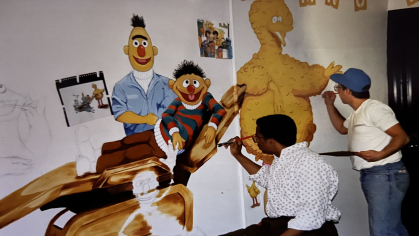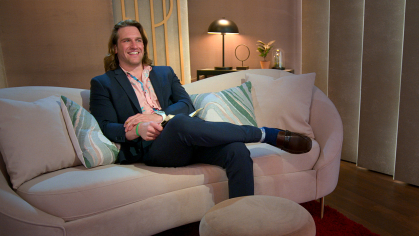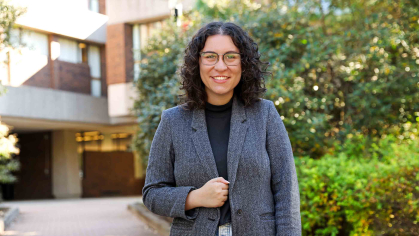Mason Gross Senior's Thesis Project Offers Food for Thought
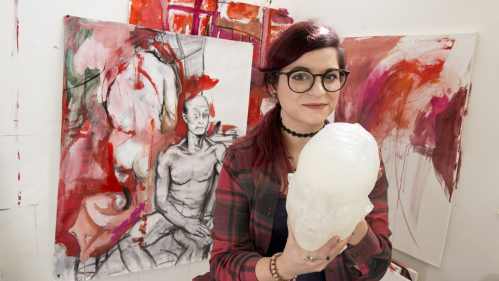
Alessandra Puglisi's Offerings pays homage to Sicilian roots and bids farewell to Rutgers family
Family, food and faith are three major pillars of Sicilian life.
Scoglitti, Sicily’s annual celebration of the Feast of Saint Joseph (March 19) is an amalgamation of all three, which explains why it ranks among Alessandra Puglisi’s most poignant childhood memories.
“I remember my Nonna and others in the town would make these bread sculptures. You couldn’t eat them. They were braided, elaborate. It felt like it was the size of my whole body,” said Puglisi, 30, a senior at the Mason Gross School of the Arts who emigrated from Sicily to Hampton, N.J., with her family when she was 11. “Massive tables that spanned entire rooms were set up to hold this gigantic feast. Everyone traveled around town to see them and sample from them. Someone would dress up as St. Joseph and knock on doors.”
Those bread-laden tables lovingly prepared with family as an offering to Saint Joseph are the inspiration behind Puglisi’s senior thesis sculpture: “Offerings.”
“In Italy, even if you’re not Catholic, you’re Catholic,” said Puglisi, who is majoring in visual arts and minoring in fine arts. “I came here and lost contact with that. I was a militant atheist for a while, and now I’m agnostic. But I love the Catholic traditions.”
Only instead of dough twisted into the likeness of baby Jesus, crosses or St. Joseph’s staff, Puglisi’s piece includes bread baked in molds she shaped into body parts – a face, arms, a torso. Her bread sculptures – each in varying sizes and states of decay – are arranged amid other items she crafted from foodstuff on a 16-foot-by-4-foot wooden table she built in the Livingston Arts Building in Piscataway.
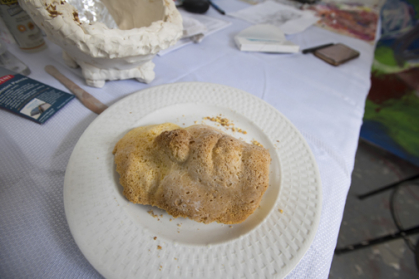
The use of bread as a medium holds a double meaning for Puglisi: it’s both a reminder of her Sicilian roots and represents her family’s literal way of life in America. Once in New Jersey, her father opened a pizzeria in Coply, Pa., named Nonna’s, after her grandmother. After high school, when her father’s health declined, Puglisi took over managing the business, but felt stunted working 12-hour days 7 days a week.
“It just sucked the life out of me,” she said. “I ended up doing everything, and really couldn’t move forward with my life except take care of the place.”
She capitalized on a chance to sell in her mid-20s, and started her life over at Rutgers. But the muscle memory from all those years of making dough stuck with her and resurfaces in this project.
“I’m trying to tie it in with coming here and the culture I am cultivating in America. It’s this gradation, like the slow loss of an accent visually and through food,” said Puglisi, who spoke only Italian when she first arrived in America and used art as a way to communicate before becoming fluent in English.
It’s been nearly 20 years since she left Sicily and more than a decade since she’s visited her 97-year-old Nonna, but the family matriarch’s presence looms large in this project.
“She was the one who brought me to church and showed me all these traditions and how to cook,” she said. “She is the stand-in for my Sicilian background. When I think of my life there, I think of her.”
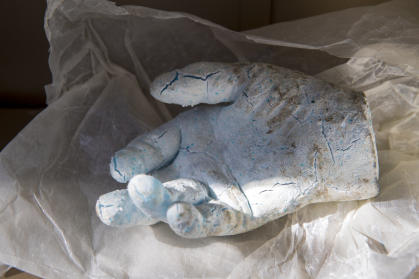
Other members of Puglisi’s family also have a seat – so to speak – at this table. A twisted life-sized pair of pale blue hands, for instance, represent her arthritic father. Since he also suffers from emphysema, she molded them from the melted cough drops he’s always popping to soothe his persistent cough.
A couple of heads – fashioned out of food wax and coated in egg and coffee – represent foods Puglisi is supposed to avoid after a bout with kidney stones almost turned into a fatal case of sepsis last semester.
“It was a scary time. I was in the hospital for eight days,” she said. “I didn’t realize how serious it was until I came out if it.”
And when Puglisi first heard that in-person instruction would end after spring break, she knew she needed to incorporate this moment into her art as well. Her last two days on campus were spent holed up in her studio, scrambling to collect and create items that would tie her work to the pandemic in a personal way.
“The people around me impacted my processes over the last two years. I knew I was going to miss them when I graduated. This just accelerated the process of losing them,” she said. “The project started off with me saying ‘Thank you’ to family in Italy, now I wanted to say ‘Thank you’ to my community here.”
Puglisi’s thesis adviser Brian Edgerton said he is awed by Puglisi and all his students’ ability to incorporate the unique challenges of this moment into their art.
“The students are teaching me in this teachable moment,” he said. “I think we are all learning what it means to be an artist. We spend our whole lives pointing our worldview through this specific set of materials and now we have decisions to make. How do we express that point of view when we no longer have access to the tools we had been expert in using?”

Puglisi grabbed little glass orbs she’d made for another project that contained locks of her friends’ hair and suspended them in a gelatin. The piece took on a Last Supper feel as Puglisi added scraps of food to the table her fellow artists were eating during their final moments together: a half-finished cup of coffee, a few bits of scrambled eggs. She cracked open the wine she’d been saving for the now postponed exhibition at Mason Gross Galleries at Civic Square and shared it in a toast with her peers. The bottle and a few of those unfinished glasses of wine made their way onto the table as well. The living sculpture waits in the cavernous room 114 down the hall from her studio space at the Livingston Arts Building. But images and video Puglisi shot of "Offerings" before she left campus are featured in Mason Gross' online BFA show opening Friday, May 1, with virtual reception and DJ dance party from 6-8 p.m. And additional samples of her work are showcased on her Instagram feed.
“I was lucky because the project looked back to begin with,” she said. “Now all we have is time and self-reflection. It fits what I’m feeling now, and what I knew I’d be feeling with the panic of the situation.”
